
Alton Sterling (left) and Eric Garner (right)
July 5, 2016 was supposed to be just another day for 37-year-old Alton Sterling; another day of working to make ends meet, another day of working to provide for his family. But the low-level entrepreneurial pursuit of selling CDs and DVDs proved to be deadly for the Baton Rouge, Louisiana man.
Pinned to the ground and shot dead by cops, Sterling didn’t stand a chance as he conducted business as usual outside a local convenience store.
Turn the clock back two years to a different Black man in a different city. Per usual, Eric Garner, 43, was standing outside a New York convenience store selling loose cigarettes — working to make ends meet.
Tackled to the ground and placed in a prohibited choke hold by NYPD officers, Garner struggled to take his last breaths while uttering, “I can’t breathe.” Those words became a rallying cry for the Black Lives Matter Movement and others demanding justice for the Staten Island man. But as historical precedence in police brutality cases will show, justice is rarely served.
According to Baton Rouge Police Department spokesman Cpl. L’Jean McKneely, officers responded to an anonymous call Monday night that a man in a red t-shirt selling CDs outside the establishment had “pointed a gun at someone” and demanded they leave the property.
Authorities arrived on the scene of what would soon become the place where yet another Black man was killed at the hands of police.
In a 48-second eyewitness video, two Baton Rouge police officers can be seen tackling Sterling to the ground, pinning his arms behind his back. At one point, Sterling is tased as officers “struggle” to restrain him.
“He’s got a gun! Gun,” an officer is heard yelling, prompting the cop nearest the camera to draw an object from his holster.
“You f-cking move, I swear to God,” said another officer.
Shots rang out soon afterward, five in total. According to East Baton Rouge Parish Coroner William “Beau” Clark, the initial results of Sterling’s autopsy show he died due to a homicide, suffering multiple gunshot wounds to the chest and back.
The moment the shots were fired, a woman in the bystander video can be heard sobbing.
“They shot him?” a man, seemingly shocked, asked. “Yes!” the woman replied, whimpering.
Officers later retrieved a gun from Sterling’s pocket, according to eyewitness and convenience store owner Abdullah Muflahi. He stood just two feet away from the altercation between police and Sterling and asserts that the Baton Rouge man never reached for his gun.
“His hand was nowhere [near] his pocket,” Muflahi said.
The store owner claims officers were aggressive with Sterling from the start as they tackled him, pinning him to the ground.
There’s no reason why or how the incident escalated the way it did, but a bystander’s video is the single strand of evidence displaying what actually happened. The officers’ body cams reportedly fell off during the confrontation, leaving many to wonder if their effort to conceal video evidence was intentional.
The graphic video has since gone viral on social media, sparking the hashtag #AltonSterling. Messages of support and demand for swift justice permeated the Twittersphere Tuesday night into early Wednesday morning.
It happened. Again. And here we are still trying to convince the rest of society that we are human. That we deserve to live. #AltonSterling
— Eryn Allen Kane (@ErynAllenKane) July 6, 2016
https://twitter.com/andreactually/status/750711788304498688
Requirements to practice your 2nd Amendment #AltonSterling pic.twitter.com/MkbGCxcK0x
— Magneto was right (@TheSimbaPikachu) July 6, 2016
The tragic cases of Eric Garner and Alton Sterling are eerily similar; two Black men in different cities working to feed their families. Yet they both suffered the same dreadful fate.
With mass incarceration worsening and the Black unemployment rate on the rise, there’s no wonder why these men may have resorted to selling illegal cigarettes, CDs and DVDs.
Per a Washington Post article, mass incarceration negatively affects the Black unemployment rate and actually makes the numbers look better than what they are. Government data shows there are twice as many unemployed Black men as there there are white men; African-American unemployment sits at 8.8 percent, while the unemployment rate for white men is 4.5 percent.
Job discrimination is also a plight many African-Americans experience while trying to making a living in the U.S. According to Atlanta Black Star, things like background checks and fingerprinting have disproportionately barred Black citizens from employment even when they showed no signs of posing a threat to a company or its consumers. Some African-Americans have even resorted to changing their “Black-sounding” names on job applications to avoid being discriminated against.
Since the video of Sterling’s death went viral, protests have formed in and around the city as supporters call for a swift investigation into the matter. Sterling’s wife and son also held a press conference to demand justice for their slain family member.
“…The individuals involved in his [Sterling’s] murder took away a man with children, who depended upon their daddy on a daily basis,” Sterling’s wife said, standing alongside her distraught 15-year-old son. “My son is not the youngest, but the oldest of his siblings. He had to watch this as it was put all over the [media] outlets.”
Sterling’s son can be heard bawling in the background.
https://youtu.be/hfNkVbe9y0Q
Like many other Black men across America, Alton Sterling and Eric Garner pushed through systemic barriers to ensure their families were provided for. Unfortunately, they paid the ultimate price with their lives.
The Department of Justice has since taken over the investigation into Sterling’s death.


